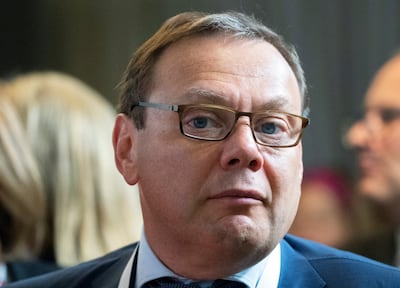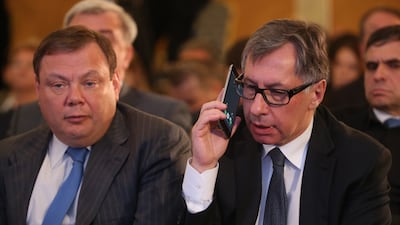Sanctions imposed on Russian billionaire Mikhail Fridman and his business partner Petr Aven over the Ukraine war have been annulled in a surprise victory over the European Union.
Brussels imposed waves of sanctions on Russian nationals and businesses for profiting or having a role in Moscow's February 2022 invasion of Ukraine but the pair mounted a legal challenge to being included on the list.
The EU’s own General Court has now ruled the bloc had failed to provide sufficient evidence that the two men had supported the Kremlin’s actions or policies against Ukraine.
The court agreed that the council's reasons were not "sufficiently substantiated and... therefore not justified" and said "no additional evidence" was advanced in later council acts that maintained the sanctions on the two men.
The court ordered the restrictive measures it imposed from February 2022 to March last year to be annulled.
Mr Fridman, 59, who also has Israeli citizenship, and 69-year-old Mr Aven, who has Latvian nationality, now live in the two countries.
Both men are major shareholders of conglomerate Alfa Group, which includes Russia's top private bank Alfa Bank and its biggest food retailer X5 Retail Group. They were placed on the EU sanctions list for their connection to the bank.
They both argued that the evidence put forward by the European Council, which represents the 27 EU member countries, was neither reliable nor credible.
The EU failed to demonstrate that the two men “have supported actions or policies that undermine or threaten the territorial integrity, sovereignty and independence of Ukraine, or that they have provided material or financial support to the Russian decision-makers responsible for the annexation of Crimea or the destabilisation of Ukraine,” the court said.
However, the EU in March last year kept Mr Fridman and Mr Aven on the lists and they remain sanctioned. The two have challenged that decision in separate cases which are still pending.
After Wednesday's ruling Mr Fridman told Bloomberg that he is “satisfied with the court’s decision”.
The men’s French-based lawyers Thierry Marembert, Aaron Bass and Roger Gherson welcomed the ruling and said it was "of the utmost significance".
“The court rightly found that all accusations against Mr Mikhail Fridman and Mr Petr Aven were completely baseless,” said the lawyers.
"Sanctioning them was a counterproductive mistake. We hope that today’s strong signal will be heard in the EU and outside.”

But leading Russian opposition figure Yulia Navalnaya, the widow of Alexei Navalny, who died in unexplained circumstances in an Arctic penal colony, slammed the decision.
"Neither Fridman nor Aven have spoken out against the war or made any efforts to stop it - they've simply hired expensive lawyers and influential lobbyists," she wrote on X.
"Lifting sanctions against Fridman and Aven is detrimental. It'll only weaken the anti-war movement and prolong Putin's stay in power."
Mr Fridman and Mr Aven are among Russia’s most prominent businessmen after making billions in banking, oil and retail. Along with partners they pocketed $14 billion from the sale of oil company TNK-BP to state-controlled Rosneft in 2013.
Their win was unexpected after an appeal by fellow tycoon German Khan was dismissed by the General Court in November.
While EU court appeals of sanctions listings can succeed, they are often temporary victories. Brussels frequently adds people back to the sanctions list after a court defeat, based on new or broader justifications.


